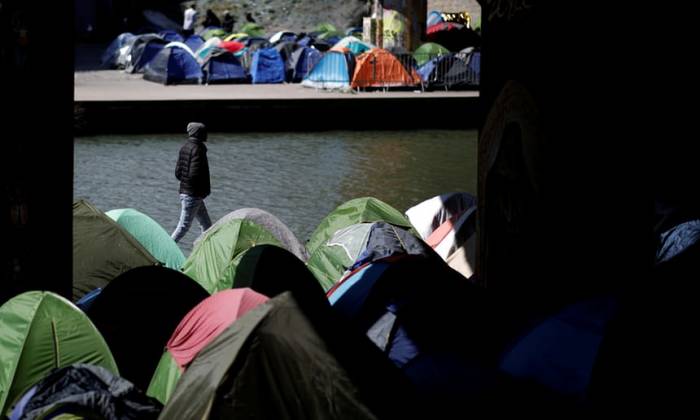One camp of hundreds of tents squeezed under a motorway bridge by the Canal Saint-Denis near Porte de la Villette was home to around 1,600 people, making it one of the biggest makeshift migrant camps in France.
Men and some women, who aid workers say have escaped violence and dictatorship in countries such as Sudan and Eritrea, are crammed into tents on a pavement with no proper sanitation.
Hundreds began gathering there during cold weather at the start of the year, and numbers had grown in recent months. There is one water point, no showers and fewer than a dozen temporary toilets.
Charities said people traffickers were targeting the camp where some migrants and refugees were still considering trying to cross the Channel to the UK. People sleeping rough there feared theft and violence.
The French citizens’ rights ombudsman, Jacques Toubon, has denounced living conditions at the camps in the north of the city as an unacceptable denial of fundamental rights. The Socialist mayor of Paris’s 19tharrondissement, François Dagnaud, warned of a “humanitarian disaster”, and the mayor of Paris, Anne Hidalgo, urged the government to provide shelter and fix the “inhuman” situation.
The Paris area prefect’s office has said plans were being considered to send police to evacuate the camp later this month, which would involve bussing people to temporary accommodation.
Aid groups said the latest camps were part of a vicious cycle in Paris over the past three years, whereby camps of migrants and refugees have been cleared by riot police, only to spring up again. There have been more than 30 such evacuations since 2015.
At the Canal Saint-Denis camp, men and women – crowded around the taps at the only water point – spoke of the physical and mental exhaustion from living outside in the cold.
Habib, not his real name, had fled from Sudan. The 18-year-old had been in Calais and Le Havre on the northern French coast, hoping to reach the UK. “From Calais it was impossible, the police were targeting us.”
He said he arrived two months ago at the Paris camp where some men were crammed three to a tent, but he slept outside. He couldn’t sleep at night, he said, because of mental health problems haunting him from Sudan, the journey to flee his home and the feeling of insecurity here. He had travelled through Libya where he had been stuck for a year in “brutal” conditions, with “mafia stealing our money” before a dangerous boat journey to Italy.
Some days he found food, others not. “I just want to study, to find a life. I don’t know what to do. There’s no school, no food, no bed, no papers.”
He said he still wanted to get to the UK “because in England you don’t sleep on the street”.
A 21-year-old from Senegal said: “There’s no real shelter. Rain leaks in and soaks you. No one sleeps properly. But where else can people go?”
Children and women at the camp tended to be moved to emergency accommodation by Paris authorities, but local politicians have demanded the government provide shelter to all rough sleepers here and at two other camps where hundreds more are gathered.
Louis Barda, the Paris coordinator for the French medical aid group Médecins du Monde, said of the Canal Saint-Denis camp: “It has become a point of transit, with some people dropped off by traffickers. You can see people arriving with bags, some come to ask us what country they are in.”
He said health issues, such as respiratory and skin problems, were a result of the “catastrophic sanitary conditions” of sleeping on the ground and in the rain. His team had provided psychological support for people who had experienced war, rape and torture, but often people also needed legal support because of pressure over administrative issues.
Paris has long faced problems of migrants and asylum seekers sleeping rough, separate to issues around Calais where a notorious makeshift camp of up to 8,000 people was dismantled 18 months ago.
Macron’s new controversial immigration law seeks to criminalise illegal border crossing, and speed up the process for asylum requests and for expelling migrants unable to claim asylum. Aid groups have argued it does not set out a long-term system to receive and provide shelter for those arriving in France.
A number of people sleeping rough in Paris had been fingerprinted on arrival in another European Union country, often Italy, and were subject to the “Dublin regulations” allowing them to be returned there. But in reality, thousands of people in this situation were sleeping rough in Europe, stuck in an administrative no-man’s land in a system that did not work, charities said.
Pierre Henry, of the NGO France Terre d’Asile, said that in the immediate term, those sleeping rough in Paris camps must be given shelter. “I would say to decision-makers: open your eyes, get everyone around the table – local authorities, aid organisations – and build lasting solutions.”
More about: #Paris
















































